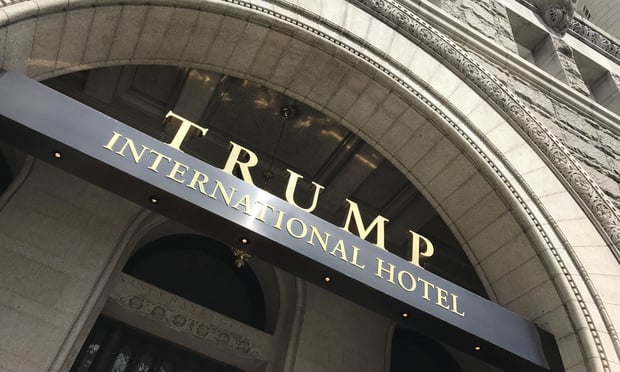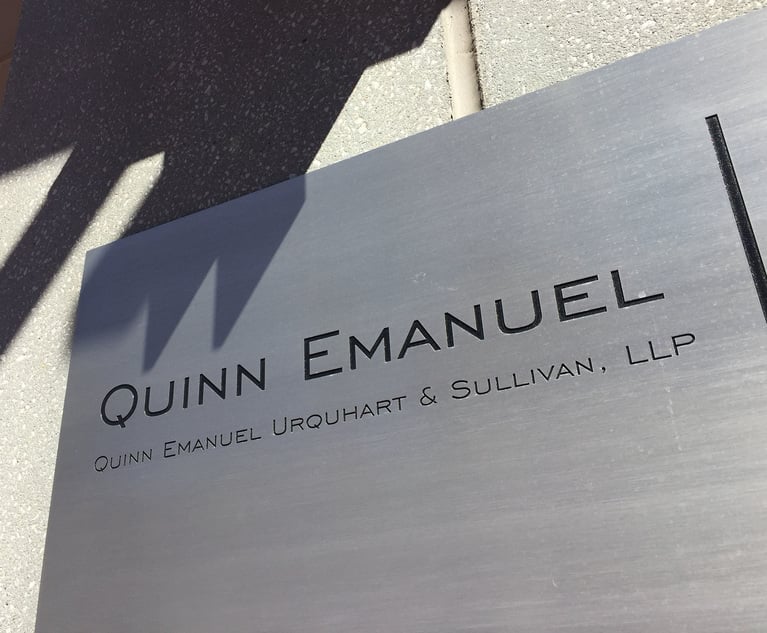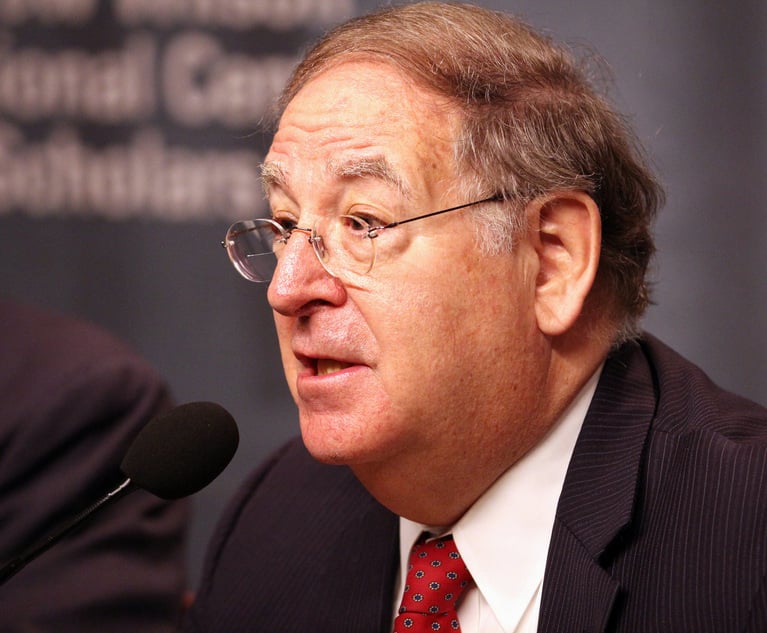Maryland, DC AGs Clear Initial Hurdle in Trump Emoluments Lawsuit
A federal judge ruled Wednesday that the attorneys general have standing to bring their lawsuit claiming the president is in violation of the Constitution's emoluments clauses.
March 28, 2018 at 02:01 PM
5 minute read

The attorneys general for Maryland and the District of Columbia are the first plaintiffs to survive a motion to dismiss in a so-called “emoluments” lawsuit, which alleges that President Donald Trump is violating the Constitution by maintaining ownership of his vast business empire while in office.
U.S. District Judge Peter Messitte of the District of Maryland on Wednesday denied, in part, the government's motion to dismiss the lawsuit brought by Maryland Attorney General Brian Frosh and District of Columbia Attorney General Karl Racine, ruling the AGs have standing to bring their lawsuit. The suit claims Trump is violating the Constitution's foreign and domestic emoluments clauses because he accepts “gifts” from foreign and domestic governments via payments to his private businesses.
Similar cases have been filed in Washington, D.C., by Democratic lawmakers, as well as by a nonprofit group and some individuals in New York. A federal judge tossed the lawsuit in New York last year for lack of standing.
In his opinion Wednesday, Messitte granted the government's motion to dismiss with respect to the president's business operations outside the District of Columbia. But, the judge said both D.C. and Maryland could show their alleged injuries are “fairly traceable” to Trump's actions with respect to his hotel in Washington, D.C.
“It can hardly be gainsaid that a large number of Maryland and District of Columbia residents are being affected and will continue to be affected when foreign and state governments choose to stay, host events, or dine at the hotel rather than at comparable Maryland or District of Columbia establishments, in whole or in substantial part simply because of the president's association with it,” Messite wrote. “The court concludes that plaintiffs are not attempting to 'stand in the shoes' of a limited number of businesses as the president suggests … they are, quite plausibly, trying to protect a large segment of their commercial residents and hospitality industry employees from economic harm.”
Messite said he would hold off on ruling on other arguments from the government, and hold a hearing as to the meaning of the emoluments clauses, and “whether plaintiffs have otherwise stated claims under the clauses.”
There is little case law on the emoluments clauses, as they have rarely been used in litigation. The AGs mainly argue that governments like the Kingdom of Saudi Arabia have spent thousands of dollars at Trump's Washington, D.C., hotel to curry favor with the president. That has diverted business from other Washington, D.C., hotels. The AGs also said state governments, like Maine's, have patronized the hotel, which has also sought to market itself specifically to diplomats.
Maryland and D.C. claimed various types of injuries from the alleged violations, such as being placed in an “intolerable dilemma” in which they must either grant special favors to the Trump Organization or risk losing out to other states that do so. Both D.C. and Maryland own properties that may compete with the Trump hotels, and claimed they could lose money as a result.
Messitte wrote that though the government argued the plaintiffs' alleged injuries were speculative, it “cannot be denied” that the Trump Organization has in fact received tax breaks from both D.C. and Mississippi. He also noted that Maine Gov. Paul LePage, while in Washington last year, stayed at the Trump International Hotel and, not long after, Trump signed an executive order regarding national monuments that could be favorable to LePage.
“Leaving aside how Maine's citizens may have felt about the propriety of their governor living large at the hotel while on official business in Washington, the fact that states other than Maryland or the District of Columbia (while, not a state) might patronize the hotel while on official business in Washington rather clearly suggests that Maryland and the District of Columbia may very well feel themselves obliged, i.e., coerced, to patronize the hotel in order to help them obtain federal favors,” Messitte wrote.
Messitte also said that with respect to the competition arguments, U.S. Supreme Court precedent showed plaintiffs with economic interests have standing to sue “to prevent a direct competitor from receiving an illegal market benefit leading to an unlawful increase in competition.”
The AGs originally filed the case against Trump in his official capacity as president, but, amended it following a motions hearing to include claims against Trump in his individual capacity, since receiving money from his businesses is not part of his “official duties” as president. Messitte said it “remains to be seen” which capacity will work for the case, but that the issue would not block the case for now.
“But looking beyond the simple denomination of his status at this point, it is clear that the gist of the amended complaint is that the president's purported receipt of emoluments, as previously defined, has nothing at all to do with his 'official duties,'” Messitte wrote. “As the president himself concedes, plaintiffs are challenging the president's acceptance of money taken through private transactions—something that has 'nothing to do with the president's service … as president.'”
Read the decision:
This content has been archived. It is available through our partners, LexisNexis® and Bloomberg Law.
To view this content, please continue to their sites.
Not a Lexis Subscriber?
Subscribe Now
Not a Bloomberg Law Subscriber?
Subscribe Now
NOT FOR REPRINT
© 2025 ALM Global, LLC, All Rights Reserved. Request academic re-use from www.copyright.com. All other uses, submit a request to [email protected]. For more information visit Asset & Logo Licensing.
You Might Like
View All
Quinn Emanuel Files Countersuit Against DOJ in Row Over Premerger Reporting
3 minute read
'Thoughtful Jurist': Maryland US District Senior Judge Messitte Dies After Short Illness
4 minute read
'Religious Discrimination'?: 4th Circuit Revives Challenge to Employer Vaccine Mandate
2 minute read
4th Circuit Revives Racial Harassment Lawsuit Against North Carolina School District
3 minute readTrending Stories
- 1South Florida Attorney Charged With Aggravated Battery After Incident in Prime Rib Line
- 2'A Death Sentence for TikTok'?: Litigators and Experts Weigh Impact of Potential Ban on Creators and Data Privacy
- 3Bribery Case Against Former Lt. Gov. Brian Benjamin Is Dropped
- 4‘Extremely Disturbing’: AI Firms Face Class Action by ‘Taskers’ Exposed to Traumatic Content
- 5State Appeals Court Revives BraunHagey Lawsuit Alleging $4.2M Unlawful Wire to China
Who Got The Work
J. Brugh Lower of Gibbons has entered an appearance for industrial equipment supplier Devco Corporation in a pending trademark infringement lawsuit. The suit, accusing the defendant of selling knock-off Graco products, was filed Dec. 18 in New Jersey District Court by Rivkin Radler on behalf of Graco Inc. and Graco Minnesota. The case, assigned to U.S. District Judge Zahid N. Quraishi, is 3:24-cv-11294, Graco Inc. et al v. Devco Corporation.
Who Got The Work
Rebecca Maller-Stein and Kent A. Yalowitz of Arnold & Porter Kaye Scholer have entered their appearances for Hanaco Venture Capital and its executives, Lior Prosor and David Frankel, in a pending securities lawsuit. The action, filed on Dec. 24 in New York Southern District Court by Zell, Aron & Co. on behalf of Goldeneye Advisors, accuses the defendants of negligently and fraudulently managing the plaintiff's $1 million investment. The case, assigned to U.S. District Judge Vernon S. Broderick, is 1:24-cv-09918, Goldeneye Advisors, LLC v. Hanaco Venture Capital, Ltd. et al.
Who Got The Work
Attorneys from A&O Shearman has stepped in as defense counsel for Toronto-Dominion Bank and other defendants in a pending securities class action. The suit, filed Dec. 11 in New York Southern District Court by Bleichmar Fonti & Auld, accuses the defendants of concealing the bank's 'pervasive' deficiencies in regards to its compliance with the Bank Secrecy Act and the quality of its anti-money laundering controls. The case, assigned to U.S. District Judge Arun Subramanian, is 1:24-cv-09445, Gonzalez v. The Toronto-Dominion Bank et al.
Who Got The Work
Crown Castle International, a Pennsylvania company providing shared communications infrastructure, has turned to Luke D. Wolf of Gordon Rees Scully Mansukhani to fend off a pending breach-of-contract lawsuit. The court action, filed Nov. 25 in Michigan Eastern District Court by Hooper Hathaway PC on behalf of The Town Residences LLC, accuses Crown Castle of failing to transfer approximately $30,000 in utility payments from T-Mobile in breach of a roof-top lease and assignment agreement. The case, assigned to U.S. District Judge Susan K. Declercq, is 2:24-cv-13131, The Town Residences LLC v. T-Mobile US, Inc. et al.
Who Got The Work
Wilfred P. Coronato and Daniel M. Schwartz of McCarter & English have stepped in as defense counsel to Electrolux Home Products Inc. in a pending product liability lawsuit. The court action, filed Nov. 26 in New York Eastern District Court by Poulos Lopiccolo PC and Nagel Rice LLP on behalf of David Stern, alleges that the defendant's refrigerators’ drawers and shelving repeatedly break and fall apart within months after purchase. The case, assigned to U.S. District Judge Joan M. Azrack, is 2:24-cv-08204, Stern v. Electrolux Home Products, Inc.
Featured Firms
Law Offices of Gary Martin Hays & Associates, P.C.
(470) 294-1674
Law Offices of Mark E. Salomone
(857) 444-6468
Smith & Hassler
(713) 739-1250










